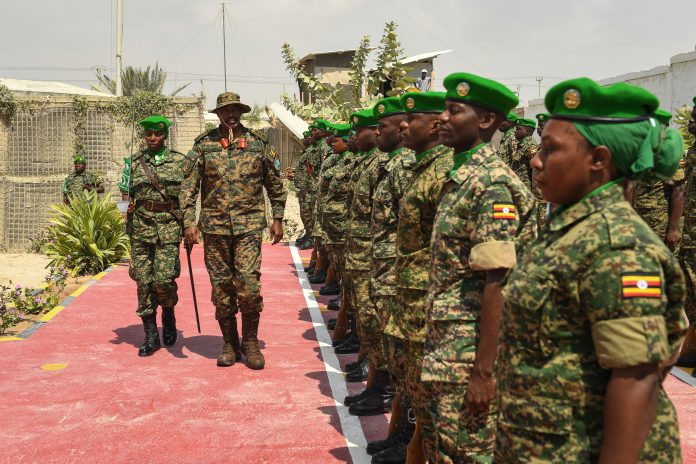MOGADISHU, Somalia (Caasimada Online) – The Africa Union Transition Mission in Somalia (ATMIS) faces challenges in achieving crucial benchmarks for stabilization in the Horn of Africa nation, raising concerns about the mission’s progress.
Issues like inadequate funding and unmet targets for security sector reform threaten the success of ATMIS.
Benchmarks at risk amid funding shortfalls
This week, the African Union Peace and Security Council (AUPSC) reported that while ATMIS has improved offensives against extremist groups and enhanced overall security in Somalia, some critical steps in the stabilization process may fall behind schedule.
The 15-member AU organ highlighted funding shortfalls as a critical concern, posing risks to the development of Somalia’s security forces.
“The Council expresses deep concern over the inadequate, unsustainable, and unpredictable financing for ATMIS, including the significant funding shortfalls, which continue to persist,” stated the AUPSC in a communique from its meeting in Addis Ababa.
The Council is again urging the UN Security Council to hold a special session on multi-year funding for ATMIS, a request initially made last year.
International community urged to support Somalia
The European Union (EU), a traditional funder of the mission, has called for increased international support in funding, security forces training, and assistance for Somalia’s internal power-sharing reforms.
With only 20 months left before ATMIS exits the country, Somalia’s transition hinges on this support.
By the end of 2024, the AU force must complete a full transition, relinquishing territory under its control and handing over all security duties to the Somali Security Forces.
However, according to EU Special Representative for the Horn of Africa, Dr. Annette Weber, the ambitious timelines for significant Somali security sector reform are not being met.
“Now, almost exactly a year into the ATMIS mandate, very few of these benchmarks have been achieved,” Dr. Weber said, urging implementation and long-term planning.
The AU has emphasized that ATMIS’s successful offensives must be accompanied by strategies and actions to extend governance and state authority in newly liberated areas.
This includes launching emergency aid programs and refurbishing infrastructure destroyed by Al-Shabab.
ATMIS is responsible for helping achieve the Somali Transition Plan (STP) and the Somali National Stabilization Strategy.
To accomplish these goals, it must bolster security, facilitate access to aid in liberated areas and support Somali government institutions, particularly the security forces. However, these tasks require significant funding.
Delays in rebuilding Somali security forces
In November 2022, the AU Peace and Security Council postponed the scheduled drawdown of 2,000 personnel by six months.
This decision signaled gaps in rebuilding the Somali security forces to assume responsibility for policing and defending the country gradually.
Ambassador Mohamed El-Amine Souef, Special Representative of the African Union Commission for Somalia Chairperson, praised ATMIS for securing territories and reducing Al-Shabab activities.
“Our ability to degrade Al-Shabab has now seen our forces increase their ability to secure Somalia’s main supply routes and to protect main population centers and vital installations and facilities,” he explained.
Despite these gains, ATMIS faces an uphill battle to ensure Somalia’s long-term peace and security due to funding shortfalls and unmet benchmarks in the transition process.


